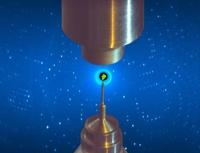Speaker
Description
Neutron scattering experiments involving soft matter materials often require specific contrast to observe different parts of the materials. In order to increase the availability of deuterium labelled materials, we are establishing deuteration support to MLZ users. Proposals for the deuteration support can now be submitted in combination with proposals for neutron beamtime.
Our main synthetic focus at JCNS-1 is in the area of polymer and organic chemistry. Anionic and controlled radical polymerization techniques allow the synthesis of various polymers with narrow molecular weight distributions. A typical example is poly(ethylene glycol) with specific degrees of deuteration in a large range of molecular weights (from oligomers to more than 200 kDA). The so obtained polymers can be functionalized afterwards to introduce diverse functional groups or be attached to molecules like proteins. We have recently started synthetic efforts towards the production of deuterated phospholipids and surfactants (e.g. Brij, Tween).
The presentation will cover the following topics: i) the contents of a deuteration proposal as well as its connection to the review process and ii) the synthetic expertise available at JCNS-1 with focus on relevant materials for life sciences.

